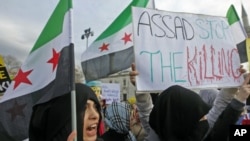The Turkish-Syrian border has become a key conduit for the Syrian opposition, including defectors in the Free Syria Army who have set up an underground network of bases.
A couple of kilometers over the border: A cellphone video captures Syrian soldiers firing on people trying to flee across to Turkey.
Locals say the Syrian army now has deployed snipers and units all along the frontier. Dozens of people have been killed in the last month.
They include Dr. Ibrahim Othman, one of the leading figures in the organization ‘Damascus Doctors,’ which ran an underground network of clinics to treat wounded protesters. Fellow activists say he was shot dead while crossing the border.
The Syria-Turkey frontier has become a key conduit for the opposition. At a refugee camp in the village of Yayladagi, one former soldier described how he defected and fled to Turkey.
“I was faced with two choices,” he said. “Either to shoot the demonstrators or to be shot myself. So I defected and fled from the army. After I did that, I got the news that my father had been shot and killed. I didn’t know what to do. They also took my cousin, he is five years old,” the soldier added. “I was not the only one who defected from the army. Another 10 soldiers fled with me and came here. All my family are at home so I cannot reveal my identity.”
Army defectors have formed the ‘Free Syria Army’ to take on Assad’s forces. Turkey has said that international forces could create a buffer zone at the border if the situation worsens. The Free Syria Army said that would give it a launch pad to topple the Assad government. But for now, the defectors are heavily outnumbered and outgunned.
One activist took VOA to see a basement safehouse in the Turkish city of Antakya. The Free Syria Army is run through a network of bases like this one.
After dark, the activists gather in the basement, greeting each other warmly.
One of them, Wael Khardy said his brother is a captain in the Free Syria Army. He said they need international help.
“There is no outside help for the Free Army and they do not have the capability [to overthrow Assad],” he said. “If they get that support, I think we will achieve the freedom of Syria, but with the current situation on the ground, it is impossible.”
So far international powers have indicated they have no plans to intervene militarily in Syria, for fear of the consequences across the Middle East. So the activists along the Turkish border - and the protesters inside Syria - will continue to fight alone.




